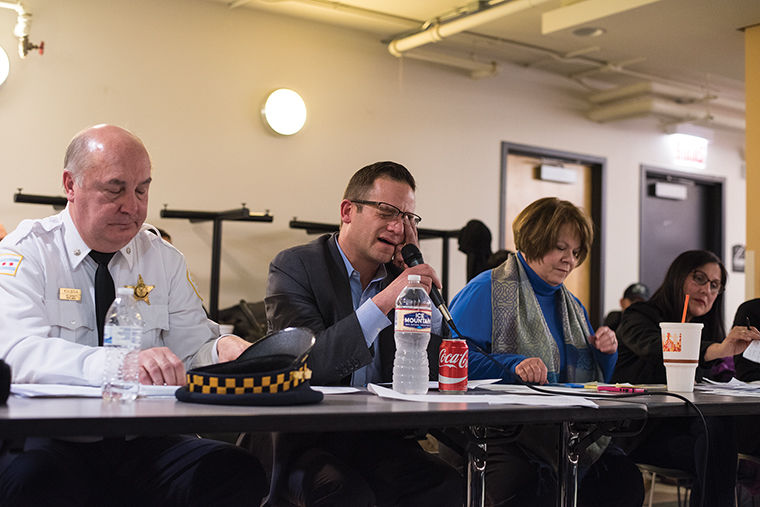West Town demands answers for surge in violent crimes
February 13, 2017
Leah Bindig was walking through the front door of her business, Aeslin Pup Hub, five minutes prior to shots being fired Feb. 3, outside 1810 W. Chicago Ave. Had the bullet been 25 feet north, it would have gone through her window, putting her employees, customers and herself in danger, she said.
“We need to know how [action] is going to be done and when,” Bindig said about ending the neighborhood’s rising violence.
Bindig was one of hundreds of residents crowded inside the basement of the Goldblatt’s Bros. Department Store, 1613 W. Chicago Ave., Feb. 6 who demanded changes and heard elected officials answer for 2016’s surge of violent crimes in West Town that rose more than 50 percent since 2015, according to Chicago Tribune’s annual crime reports.
According to Chicago Police Department Cmdr. Ed Kulbida, District 12, the neighborhood is seeing an “epidemic” of juveniles from other neighborhoods stealing cars from local dealerships and using them for robberies. At the meeting, organized by 1221 beat facilitator Kim Shepherd, Kulbida addressed multiple recent West Town shootings and asked for support from residents.
“Instead of turning your head to what you see, report what you see,” he said.
Kulbida asked residents to mark their garages with addresses and give their house alarm codes to those they trust—specifically nannies and dog walkers—to keep police officers proactive in the neighborhoods instead of frequently answering unnecessary calls.
In turn, Kulbida promised more officer foot patrols on the streets.
“Now that we have [32] more officers, I will be putting them out there as soon as tomorrow,” he said.
State Rep. Cynthia Soto, D-Chicago, Rep. Melissa Conyears-Ervin, D-Chicago, and Ald. Joe Moreno (1st Ward) accompanied Kulbida and attempted to ease the heated discussion with promises for combating the neighborhood violence.
According to Moreno, the city has about $80 million left from a property tax relief ordinance that he has been allocated to spend on preventative crime services—for which the state allocates no funds—and additional police officers. He said his direct communication with CPD Superintendent Eddie Johnson has resulted in more police being added to the 12th District than any of the other 22 districts.
“[Other] aldermen believe where we live does not deserve the same police attention as where they are,” Moreno said. “What I say to them is our neighborhood does not need to suffer because of [its] success.
Multiple audience members commented on elected state officials’ lack of accountability to spearhead changes on the state level, specifically the failed enforcement of gun control and lack of discipline for juveniles with multiple offenses on their record.
Soto suggested having future community meetings at different locations in West Town to address those concerns. However, attendees said they wanted immediate answers.
“So, it’s either the city or the country, just because Soto is [being] quiet?” remarked one attendee in the crowd. “Do your job.”
Dan Johnson, president of the East Village Association, suggested a weekly update from elected officials, laying out accomplishments with money, resources and legislation that particular week.
“Elected officials can look at the picture of who was here tonight and think about what’s going to happen every few years when they don’t send out that update,” Johnson said.
A list of expectations for Mayor Rahm Emanuel and other city and state officials was read on behalf of several West Town neighborhood groups.
The list, read by West Town Neighbors Association President Liz Tomka, includes changes to the Illinois statutes to make attempted home invasion illegal, changing what constitutes trespassing and a shift in the definition of “terrorist” to include domestic street gangs. Illegal gun possession being addressed under the federal government and producing minimum 5-year sentences was also suggested.
Shepherd also established ways community members could start a public safety committee that meets monthly and distributes reports to aldermen, attending CAPS meetings “regardless of crime levels that week,” volunteering to be an advocate against dangerous offenders in court, and placing “no trespassing” signs around the neighborhood.
Inspired by the meeting’s turnout, Kulbida told the crowd he had never seen a community come together like this in his 33 years on the job.
“If this was happening throughout the city, we wouldn’t have the problems we have now,” he said.








